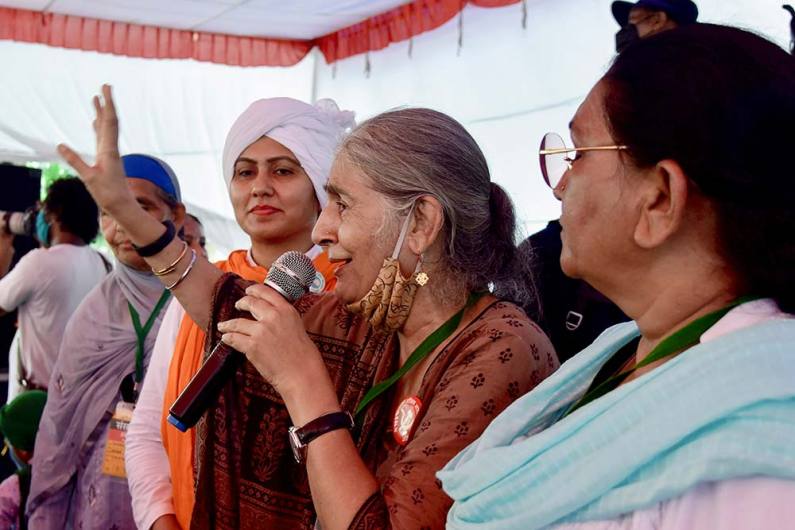Minister’s Remarks Show ‘Conservative, Poor’ Thinking: Ali
Oct 12, 2021 | Pratirodh Bureau
Subhashini Ali can be seen with women farmers during the Kisan Sansad against the Centre's farm reform laws at Jantar Mantar in New Delhi (PTI)
The Communist Party of India (Marxist) Politburo Member and women’s rights activist Subhashini Ali on Monday condemned Karnataka Health Minister Dr K Sudhakar’s remarks on ‘Modern Indian Women’ and said that they reflect his “conservative and poor” thinking.
Subhashini Ali accused the minister of showing his ‘Manuwadi’ thinking and said that no other person should decide on behalf of women what they should do or how they should lead their life.
Launching an attack on Sudhakar, Ali said, “(The) Karnataka Health Minister is showing his ‘Manuwadi’ thinking, which means how women should be, it should be decided by other people. As per this thinking, anything about herself, about her body, about life should not be decided by herself. Such a woman is considered an ideal woman, which we call ‘Manuwadi’ thinking.”
“This is very conservative and poor thinking and in today’s era, speaking in this manner means taking the society backwards. Whether a woman marries or not, she has babies or not, how many does she have, this is her personal matter,” he added.
On Sunday, K Sudhakar had said that there has been a paradigm shift in modern women’s thinking as they do not want to get married and give birth to babies.
During the World Mental Health Day at the National Institute of Mental Health and Neurological Sciences (NIMHANS) on Sunday, Sudhakar had said, “Today, I am sorry to say this, lots of modern women in India want to stay single. Even if they get married, they don’t want to give birth. They want surrogacy. So there is a paradigm shift in our thinking, which is not good.” Issuing a clarification on Monday, Sudhakar said, “It is unfortunate that a small part of my address out of the nineteen and a half minutes long speech during the World Mental Health Day programme at NIMHANS on Sunday is taken out of context… thereby losing out on the larger point I was trying to make…”
Meanwhile, he said that being the father of a daughter and a medical doctor by training, he understood the sensitivities around women and also mental health issues.
Sudhakar said that it is widely established through research and studies that in a situation where the mental health resource is a scarcity, families form a valuable support system, which could be helpful in management of various stressful situations.
“(Unlike Western society) Indian society is collectivist and promotes social cohesion and interdependence. The traditional Indian joint family, which follows the same principles of collectivism, has proved itself to be an excellent resource for the care of the mentally ill,” he said.
According to him, the Indian and Asian families are therefore, far more involved in caring for their members and also suffer greater illness burden than their Western counterparts.
Sudhakar said his statement about the younger generation shying away from marriage and reproduction is also based on a survey.
The findings of YouGov-Mint-CPR Millennial Survey show that, among millennials, 19 per cent aren’t interested in either children or marriage, the minister said. He added that another eight per cent want children, but are not interested in marriage.
“Among post-millennials (or Gen Z adults), 23 per cent aren’t interested in either children or marriage. As in the case of millennials, eight per cent want children, but are not interested in marriage. There are very little gender-wise differences in these trends. It is applicable to both boys and girls,” Sudhakar said.
The minister said he was trying to convey that the youth can find a solution to mental health issues like anxiety, depression and stress in our traditional family and its value system, which offers wonderful support.
“I would like to clarify that I had no intention to single out women nor did my words mean so,” Sudhakar clarified.
